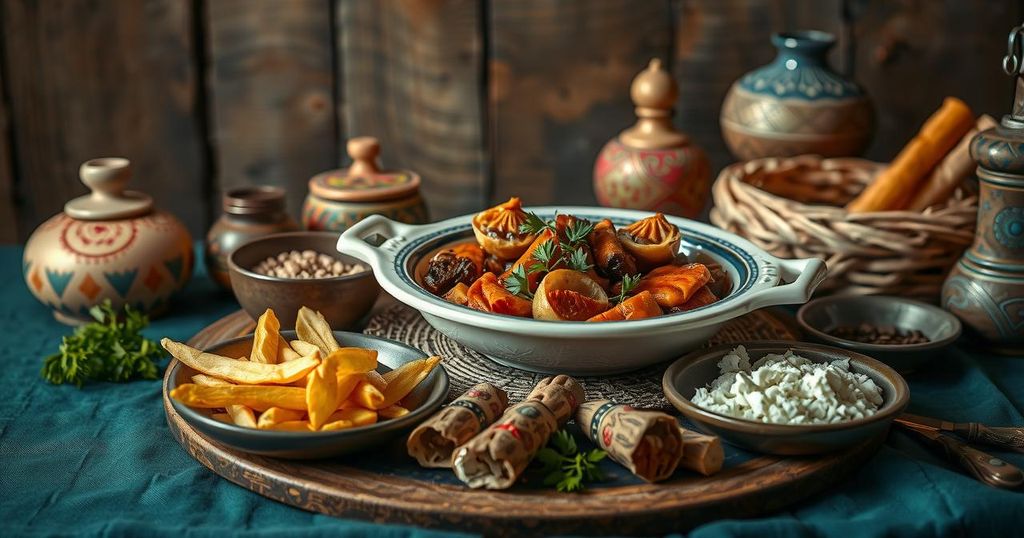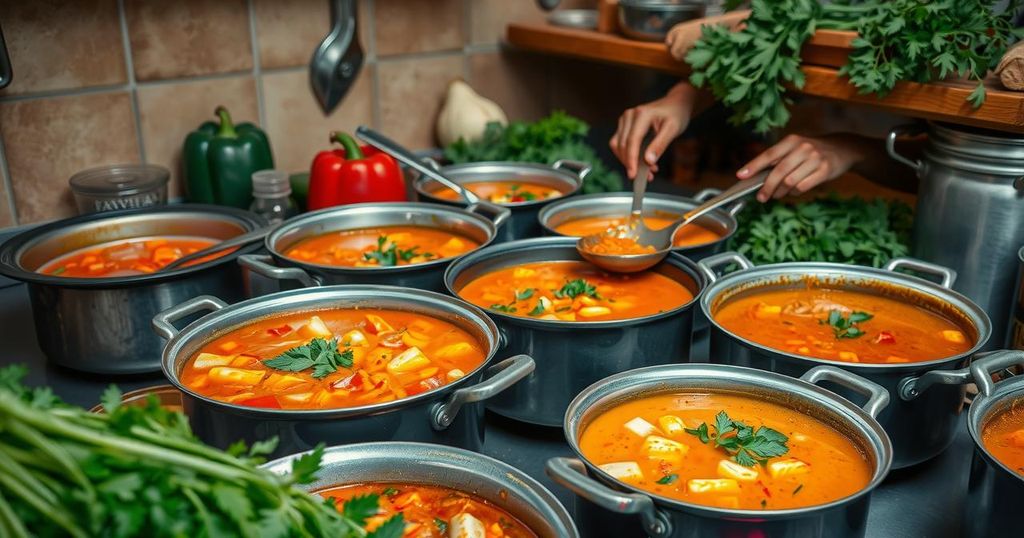Kazakh Cuisine: A Rich Tapestry of Tradition and Flavor
Kazakh cuisine encompasses a profound connection to home and tradition, thriving on the use of horse meat and celebrating a rich culinary heritage. Notable restaurants, such as Auyl and Qazaq Gourmet, offer authentic experiences that capture the essence of this cultural expression. Ultimately, homemade dishes symbolize the warmth and familial bonds characteristic of Kazakh hospitality, emphasizing the significance of food within the broader context of cultural identity and community.
Kazakh cuisine, deeply intertwined with the cultural and historical identity of the Kazakh people, goes beyond mere sustenance; it serves as a profound expression of home and tradition. The award-winning Auyl restaurant in Almaty exemplifies this culinary heritage, providing an immersive experience that captures the neo-nomadic spirit of the region. With horse meat as a primary ingredient, Kazakh food may seem exotic to outsiders, yet it forms the backbone of a rich culinary tradition shaped by generations of nomadic lifestyle. Foreign visitors to Kazakhstan are often encouraged to embrace local cuisine as a vital part of their journey. Although horse meat can be a challenging concept for some, it is a staple that has sustained Kazakhs through a harsh climate. As an avid traveler, I recommend that newcomers approach Kazakh dishes with curiosity and an open mind. The warmth and hospitality found in family meals, such as the revered beshbarmak, reflect the enduring bond between food and familial roots. Kazakhstan’s cuisine has evolved over the years, particularly influenced by increased global interactions and trade along the Great Silk Road. Recently, a renewed interest in traditional Kazakh food has sparked a culinary revival, with an influx of restaurants celebrating authentic recipes and innovative designs that honor the culture’s shared history. An exemplary venue, the Ayul restaurant, offers a nostalgic atmosphere reminiscent of traditional yurts, where guests savor dishes like baursak and balqaimaq, celebrating the lavishness of Kazakh flavors. In Astana, Qazaq Gourmet presents a taste of traditional beshbarmak as the heart of significant gatherings, while also offering comforting horsemeat broth—both celebrated dishes in Kazakh culture. Furthermore, the Selfie restaurant showcases modern interpretations of traditional dishes, focusing on local ingredients and culinary creativity, epitomizing Kazakhstan’s ambitious spirit. Ultimately, in addition to the exquisite experiences offered by local restaurants, the most cherished memories of Kazakh cuisine are often found in domestic kitchens. The heartfelt preparation of beshbarmak by mothers or grandmothers provides a rich narrative of connection and love. As expressed by culinary professionals, the most authentic interpretations of Kazakh dishes often emerge from home kitchens, reinforcing the notion that food is fundamentally about gathering and belonging. The essence of Kazakh cuisine therefore lies not only in its distinctive flavors but in its ability to evoke a profound sense of home, community, and cultural identity.
Kazakhstan’s cuisine reflects its nomadic heritage, shaped by the challenges of its environment, including harsh winters and vast steppes. The integration of horse meat into daily diets is a response to historical necessities, establishing a culinary tradition that resonates strongly with Kazakhs. With increasing interactions from diverse cultures, Kazakh food has undergone significant transformations, leading to a resurgence of traditional dishes that highlight local ingredients and cooking styles. The restaurant scene in Kazakhstan has flourished, facilitating cultural pride and exploration of one’s culinary roots, alongside modern interpretations that cater to the evolving palate.
Kazakh cuisine serves as a vital representation of the nation’s cultural identity, where each dish tells a story of heritage, survival, and communal ties. Establishments like Auyl and Qazaq Gourmet celebrate this connection to tradition while adapting to contemporary tastes. However, the true essence of Kazakh food is most poignantly expressed in home settings, where meals are infused with love and warmth. The enduring relationship between food and the concept of home illustrates that each dish is not just meant to nourish but to foster connections and evoke a sense of belonging, essential to the Kazakh identity.
Original Source: astanatimes.com




Post Comment